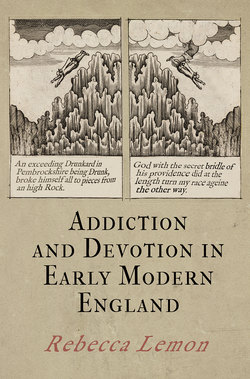Addiction and Devotion in Early Modern England

Реклама. ООО «ЛитРес», ИНН: 7719571260.
Оглавление
Rebecca Lemon. Addiction and Devotion in Early Modern England
Отрывок из книги
Addiction and Devotion in Early Modern England
Rebecca Lemon
.....
As powerful as this medieval framework of the deadly sins might be, by the sixteenth century writings on drunkenness shift away from the schema to a more pointed view of drunkenness as disease and reprobation.70 From Shephard’s attack on Catholic curates in “Doctor Double Ale” to Skelton’s infamous misogyny in “The Tunning of Elynour Rumming,” allegations against drinkers offer satirical portraits of corruption and hypocrisy.71 What had been deemed errancy and sin, in need of salvation and forgiveness, is increasingly figured as compulsion, the inability to shift away from drinking. To John Downame, as for other puritan writers, those who “addict themselves to much drinking” prompt a spiritual, economic, and legal crisis.72 William Perkins thus warns his allies “not to addict ourselves to drinking,” while William Prynne chidingly writes, “The people given to idlenesse and vaine discourse doe in these dayes addict themselves more to drunkennesse, surfetting, Playes and wantonnesse, than to divine things.”73 Writers bolster their arguments with medical diagnoses, anticipating the modern notion of addiction as compulsive, pathological attachment. Texts such as The Drunkards Cup, Diet for a Drunkard, The Drunkard’s Character, and The Condition of a Drunkard speak of drunkenness as a physical disease and as a defining identity much earlier than current narratives on the rise of “modern” addiction suggest.74
Downame elaborates on the two ways that drinkers abuse themselves: “First by drunkenness, when by immoderate swilling and tipling they are deprived of the use of their reason, understanding, and memory; so as for the time, they become like unto beasts. Second, by excesse, when as they addict themselves to much drinking, and make it their usual practice to sit at the wine or strong drink.”75 While “drunkenness” and “excess” might seem synonymous to modern audiences, for Downame they are distinct. “Drunkenness” describes the phenomenon of overdrinking, regardless of how often—drunkenness produces, he says, substance-related problems (deprivation of “reason, understanding, and memory”). “Excess” denotes habitual overdrinking or compulsive use (a “usual practice” of excess, as men “sit at the wine or strong drink”). Thus, both singular drunkenness and habitual drinking are part of the dangers of alcohol. Addiction appears, Downame claims, when the drinker can no longer abstain: “They who addict themselves to this vice, doe finde it so sweet and pleasing to the flesh, that they are loath to part with it.”76
.....